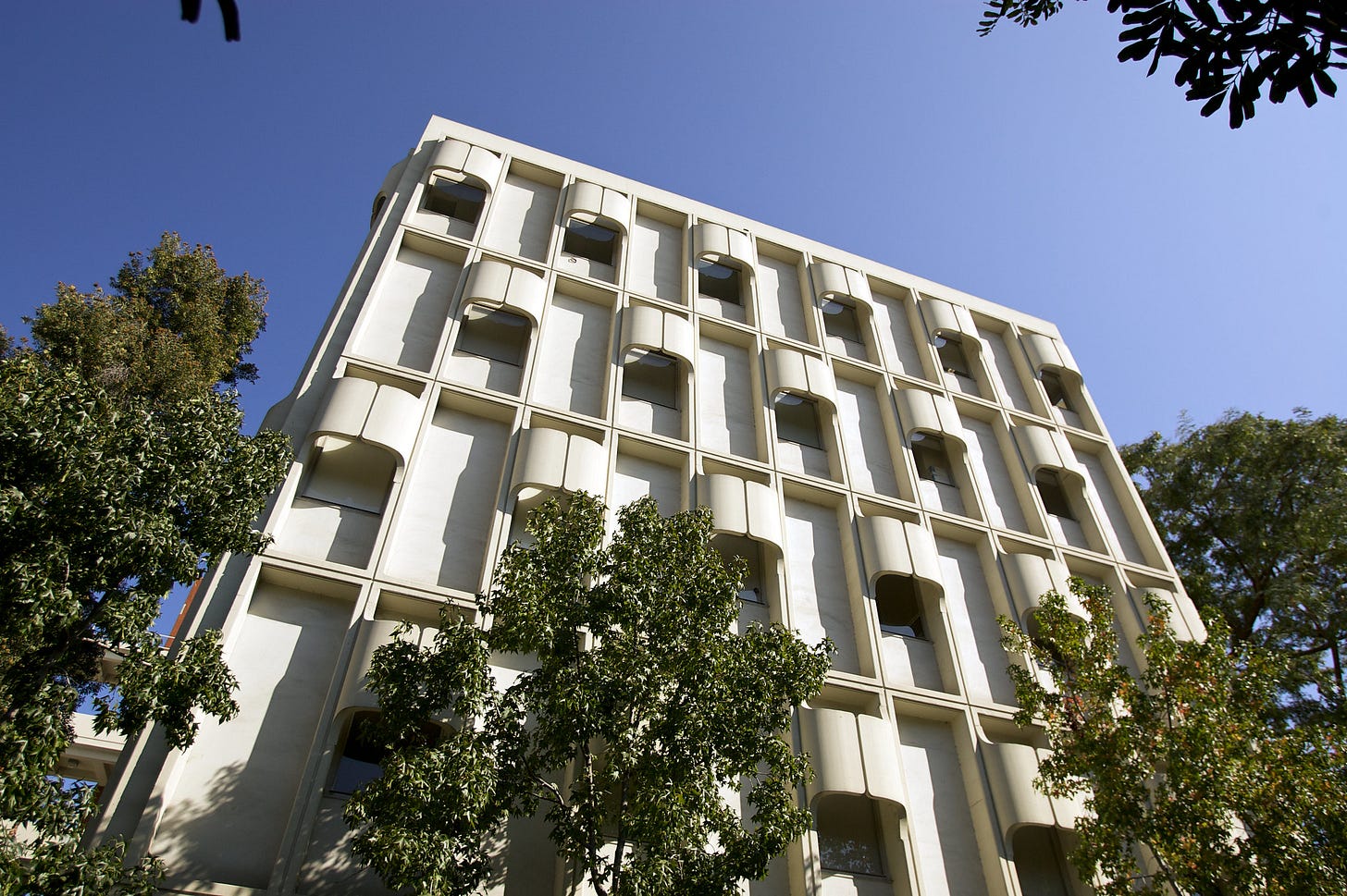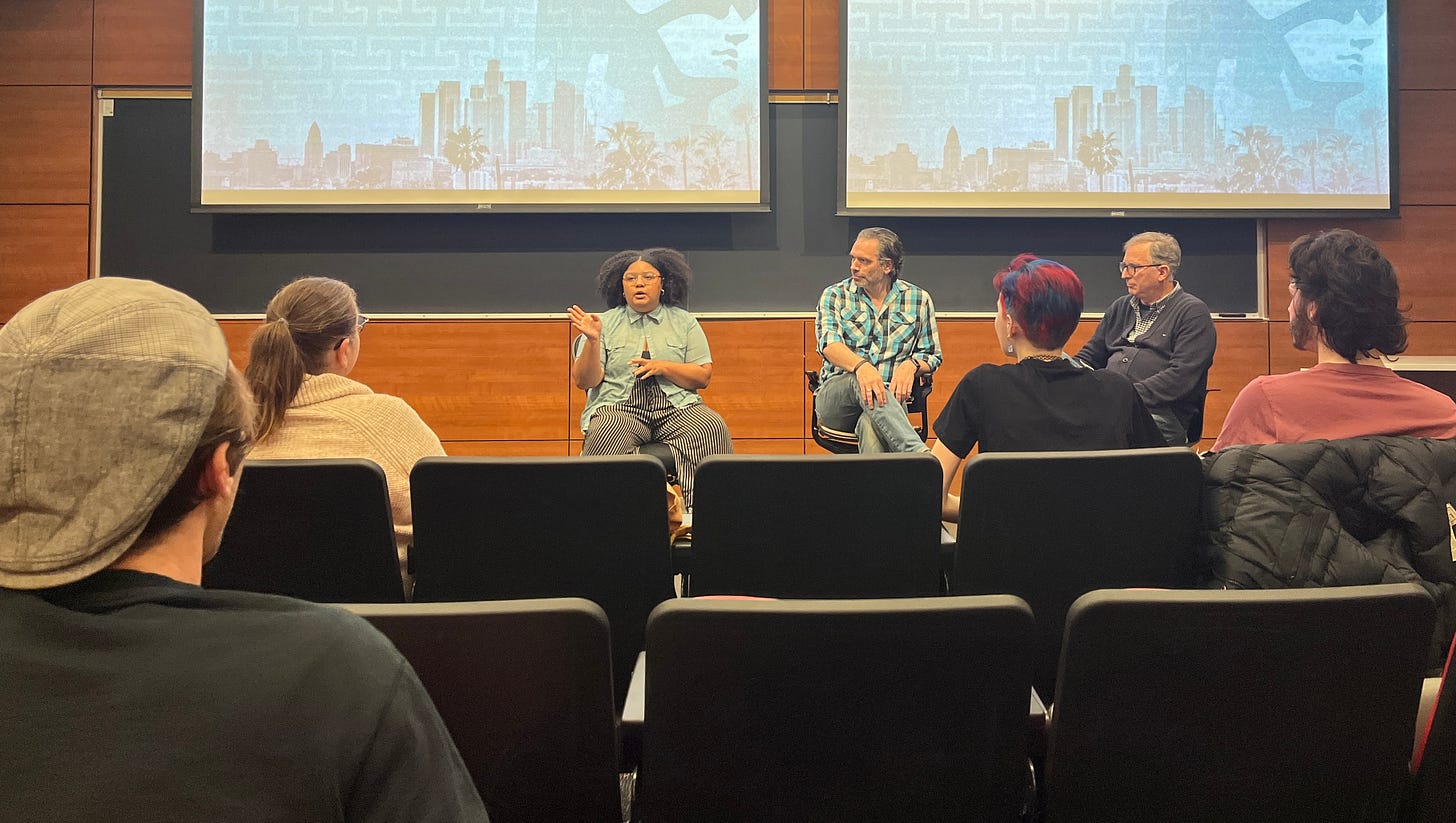What's in a name? Not DEI anymore
A name change comes to our favorite "Unifying Value," plus: budget woes and the public's perceptions of campus protests.
We’re attempting to cover everything we can with the flurry of higher education and USC news, but if we’ve missed something or you have feedback please reach out to us at heterodox.usc@gmail.com.
Thank you to those who came out to our March Heterodox Academy campus events, which included a screening of Blindspot and a discussion of free speech and comedy (pictured below).
Are you hosting an event soon that you think our 650 readers would be interested in? Please contact us at heterodox.usc@gmail.com so we can promote.
DEI’s Transition
We’ve mentioned before that USC seemed to be renaming DEI or shifting it over to the “Culture Team.” (The College Fix recently picked up our coverage.) In particular, we pointed out that DEI remained one of the “Unifying Values” of the university — despite, once again, the fact that no one voted for that value »
Then, yesterday, the provost sent out a letter announcing that the DEI value has now been “broadened” to “Community”. It came with a rewrite of that section of our Unifying Values. We’re sharing these sections below for our readers to review.
The original, DEI:
The revised “Community” section:
While we appreciate the removal of a value no one voted for, we’re not sure this accomplishes much to address the actual problems, which started long before the 2010s, as we covered here. In fact, we suspect this change came about only because of catastrophic threats to federal funding which the university relies upon.
How much the university is actually rejecting the tenets remains to be seen. All of the same staff that were explicitly hired to push the original DEI Unifying Value, along with even more DEI staff that moved over from the old DEI office, are still on the payroll in the Culture Team office.
If university leadership has had a genuine change of heart, we need to see it in action. Will the university now hire or tolerate faculty who openly challenge liberal orthodoxies? How does it propose to do that now that decades of politicized hiring has made many departments unwilling to even interview non-progressive candidates? Will it stop forcing all our liberal arts students to pay for DEI classes before they can graduate?
Budget Bummers
This doubling down on a well-staffed Culture Team is particularly frustrating given that the university is struggling financially. A recent letter from the president announced hiring freezes, permanent budget cuts, cessation of merit raises, and other disconcerting changes. USC has also been rescinding graduate student offers.
How about taking a look at administrative bloat? If we can’t afford new faculty or graduate students or raises for kitchen staff, do we really need a “Culture Team” or a “Sustainability Hub” which does no classroom or research work?
We sincerely hope that the university is not dismissing federal funding cuts as just “right-wing attacks on education and diversity.” This is the inevitable result of ignoring decades of escalating frustration at the hyper-politicization, ideological capture, astoundingly harmful ideas, and administrative bloat of higher education, as we’ve already mentioned. The warnings have been abundant.
In our view, universities face an existential challenge that is not going to be corrected by furiously scrubbing DEI references from websites, freezing hiring, and battening down the hatches until a more friendly administration comes in.
The first university that actually starts boldly acknowledging and course-correcting around these critical problems stands to benefit enormously.
Protest Popularity
Recent research from the USC Center for Applied Research in Education produced insight into the public’s feelings about campus protests. Turns out, most of the public really dislikes disruptive protests such as interrupting graduation, shouting down speakers, defacing school property, or occupying buildings. The time, place, and manner restrictions of the First Amendment seem popular:
They're more supportive of university efforts to shut down or curtail protests, although they’re open to nuance:
The Authoritarian Endgame on Higher Education
The New York Times editorial board is beginning to admit that academia may be facing a crisis not because Trump supporters are slack-jawed fascism enthusiasts who hate truth, but because universities are failing at their overall mission [our emphasis added]:
For people in higher education, this is a moment both to be bolder about trumpeting its strengths and to be more reflective about addressing its weaknesses. About those shortcomings: Too many professors and university administrators acted in recent years as liberal ideologues rather than seekers of empirical truth.
Academics have tried to silence debate on legitimate questions, including about Covid lockdowns, gender transition treatments and diversity, equity and inclusion. A Harvard University survey last year found that only 33 percent of graduating seniors felt comfortable expressing their opinions about controversial topics, with moderate and conservative students being the most worried about ostracization.
They’re right to point out that universities produce huge amounts of valuable medical and scientific research. Yet, they refrained from admitting that this “silencing of debate” may be disastrously poisoning that particular resource. They seem to think that the silencing merely quashes discussion in the faculty lounge, rather than hamstringing scientific advancement.
More:
“The insularity of American academia is appalling,” said Michael Roth, the president of Wesleyan University. “It has led to massive resentment against intellectual elites.” This insularity does not justify Mr. Trump’s policies, but it does help explain the dearth of conservatives defending universities today. Universities will be in a stronger long-term position if they recommit themselves to open debate.
We agree, which is why we created this group and our newsletter. As for trumpeting academia’s value, see our regular section below on interesting USC news and research.
NSF’s Woke Science Problem
Speaking of the poisoning of scientific research, you can read a letter from Jim Moore, Professor Emeritus of Industrial and Systems Engineering at USC Viterbi, in The Chronicle of Higher Education in response to The Rise and Fall of the National Science Foundation.
As Moore points out, that article failed to provide a link to the “woke” NSF research projects flagged for review. If they had, readers may have found such projects as this one, which has already received some $260,000 of its allocated $387,000 funding:
COLLABORATIVE RESEARCH: A QUALITATIVE INQUIRY INTO SEX/GENDER NARRATIVES IN UNDERGRADUATE BIOLOGY AND THEIR IMPACTS ON TRANSGENDER, NON-BINARY, AND GENDER NON-CONFORMING STUDENTS -THIS PROJECT EXAMINES HOW A MORE ACCURATE CURRICULUM ABOUT THE DIVERSITY OF SEXES FOUND ACROSS SPECIES, THE ROLE OF THE ENVIRONMENT IN SEX DETERMINATION, AND THE COMPLEX RELATIONSHIP BETWEEN SEX AND GENDER CAN CREATE A MORE INCLUSIVE ENVIRONMENT FOR TRANSGENDER, NON-BINARY, AND GENDER NON-CONFORMING (TNG) STUDENTS IN UNDERGRADUATE BIOLOGY COURSES
A sensible use of $387,000 of tax payer dollars, no doubt!
Upcoming Events

Why Did Latinos Vote the Way they Did?
Wednesday April 2 | 11am - 12:15pm | Zoom
Join the USC Annenberg Center on Communication Leadership and Policy and the USC Dornsife Center for the Political Future for a virtual conversation with top political analysts who will explore the motivations and characteristics of Latinos who played a critical role in the 2024 election. USC professor emeritus Roberto Suro will present findings from a new survey probing partisan differences, the gender gap, and the high rate of abstention among Latino eligible voters. RSVP»
Interesting News and Research from USC
7 USC professors join prestigious ranks of AAAS fellows
Nasdaq’s opening bell will ring for USC research startup
English architect who designed iconic USC buildings subject of new exhibit
Alum Adam Vesperman moves from Billy Elliot to touring the world
USC Sophomore’s Algorithm is Helping Pediatric Cancer Patients
USC study finds calorie-free sweeteners can disrupt the brain’s appetite signals
We welcome your news, opinions, and responses. Please contact us at heterodox.usc@gmail.com. We’d also appreciate if you forwarded our email to USC faculty, alumni, parents, staff and students who may share our concerns and priorities.












Three-card Monte?
Although blacks are scapegoated as the face of DEI, white women benefit more than any other demographic.
https://shorturl.at/n1frY